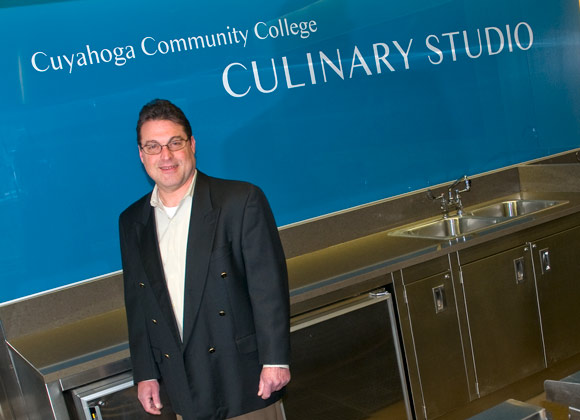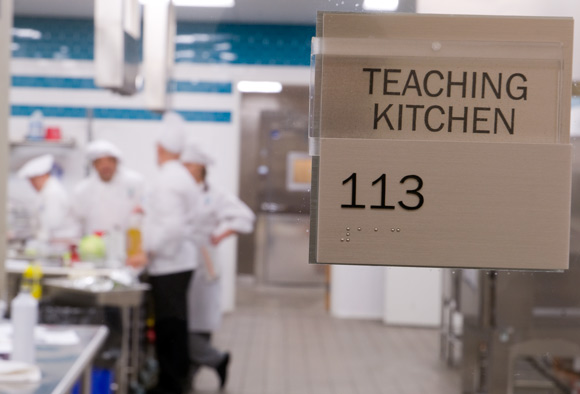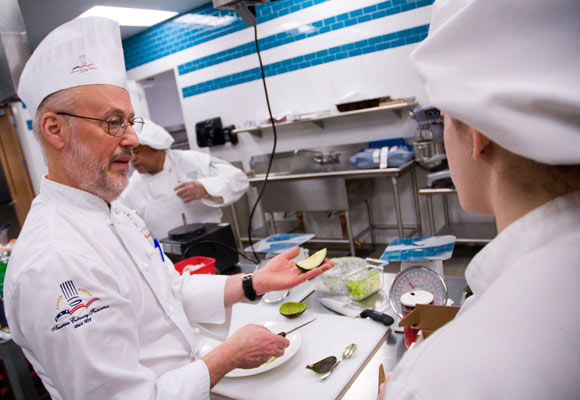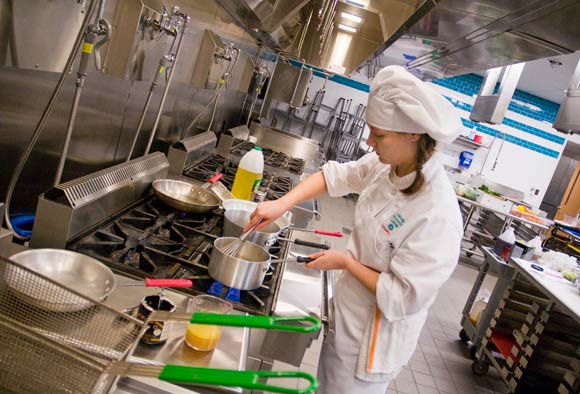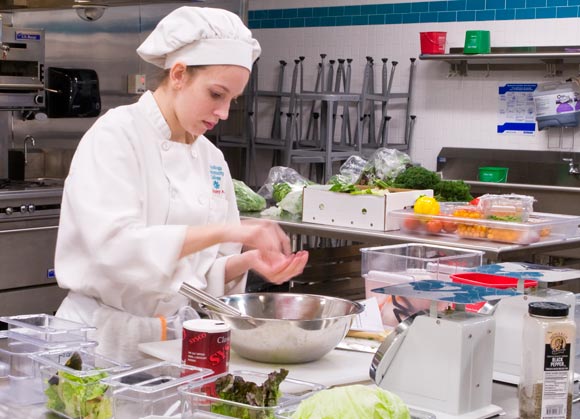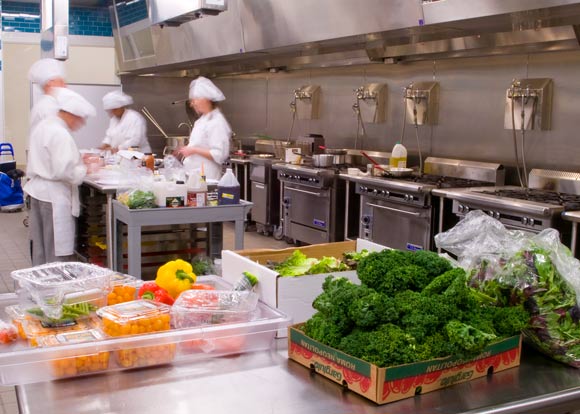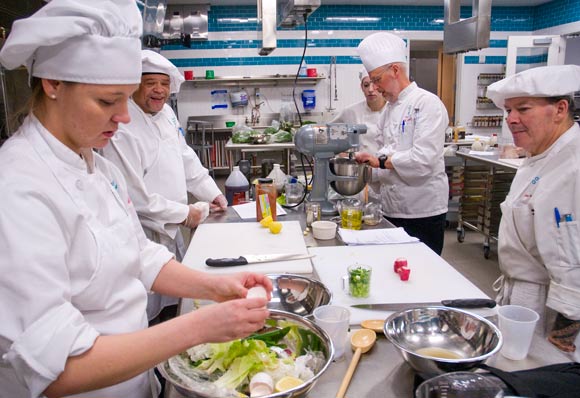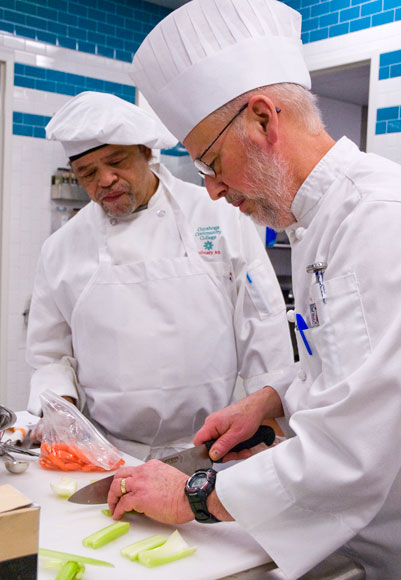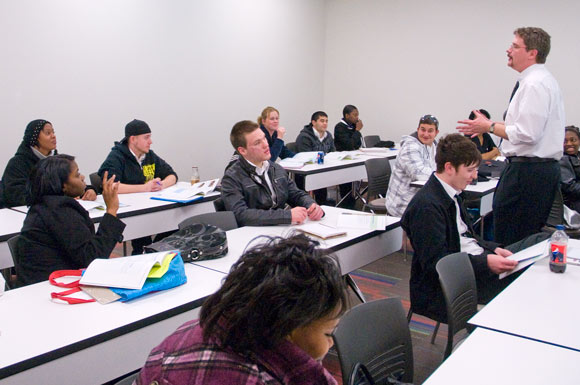main course: tri-c's new hospitality facility deepens local culinary talent pool
This past October, Cuyahoga Community College relocated its 20-year-old hospitality management and culinary program from the older Metropolitan Campus to a gleaming new complex on Public Square. Although the move from E. 33rd and Woodland to the center of downtown was less than a half-mile, the shift will forever change Cleveland's culinary economy.
A multi-million-dollar restoration project has transformed the historic but long-abandoned May Company building into one of the city's boldest development showcases. The 25,000-square-foot facility features top-of-the-line instruction kitchens and high-tech classrooms that employ video monitors and internet streaming. Also in the facility is a demonstration studio and elegant reception hall.
Distinct from the usual take-your-money-and-run cooking schools, this facility unites students, instructors, restaurateurs and working chefs under the common goal of enriching the local culinary economy. The new location affords students frontline access to the heart of Cleveland's booming food scene. East Fourth Street is just blocks away. Ohio City is across the bridge. And come spring, Brandt Evans, chef-owner of Blue Canyon, will unveil his new restaurant directly next door, further blurring the line between student and staff.
"Partnerships are what make our program different," says Gregory Forte, Dean of the Hospitality Management program. "Most people -- from chefs to the public -- realize that our economy and culinary scene are strongest when we are a collective and work together, and our new location is that central hub that encourages us to thrive."
The hospitality industry is a significant and growing portion of the local economy. According to school staffers, restaurant employment makes up over 10 percent of total employment in Ohio, and the industry is expected to add another 1.3 million jobs by 2020. Imminent downtown development such as the casino, medical mart and convention center, and numerous new hotels and restaurants promise to add a significant strain on the culinary talent pool. At a time when the city's food scene continues to attract national attention, Cleveland's hospitality industry needs all the talent it can muster.
"We already have access to terrific food in Northeast Ohio, with our stellar farms and markets, and existing restaurants," says Brandt Evans. "But we need to nurture talent here and Tri-C's program does that."
As the only accredited culinary program in Northeast Ohio, Tri-C offers a two-year associates degree that prepares students for cooking and management positions in the restaurant and hospitality industry. The school will prevent students from leaving the region while improving the level of local culinary standards. "Over 80 percent of Tri-C students stay in the area after graduation, which is important for our economy," says Stephen Quick, Director of Hospitality Management. Presently, 400 students are enrolled in the program, representing a 30-percent jump over the past three semesters.
Students range from fresh out of high school to more mature "second-career" students looking for a change. Some had been laid off during the recent recession, while others are long term food industry vets looking to beef up their skills. The program is flexible, structured both for full- and part-time students. Most students work in the industry while enrolled, and the program requires 210 hours of internships or other industry work before graduation.
Currently in her second year of the program, Marlo Bernadi is a former communications professional with experience working in some of Cleveland's finest restaurants, including Michael Symon's Lolita. After being laid off and struggling to find employment in her field, she took a deep look at what she really wanted to do with her life. Food is her passion, so she began researching culinary programs in Pittsburgh and Chicago. Tri-C, she ultimately decided, offered the biggest bang for her buck. At less than $90 per class, a student can graduate for around $6,000 compared to upwards of $25,000 at other schools.
"I've just been blown away by the quality of the instructors and facilities," says Bernardi, while grabbing a break between classes. "We get people that have worked in all aspects of the industry, we get to learn from top-level chefs, and we have access to some of the best equipment out there."
With the goal of opening a local deli upon graduation, Bernardi feels well prepared in everything from pricing and food prep to sanitation and safety. Classes covering traditional patisserie, Asian foods, and emerging fusion trends have expanded her culinary horizons.
When it opens this spring, Pura Vida will add another jewel to Cleveland's culinary crown. Already a local celebrity thanks to the success of his Twinsburg restaurant Blue Canyon, chef Brandt Evans is promising a contemporary show-stopper that will take advantage of the latest culinary trends.
A graduate from New York's Culinary Institute of America, Evans knows the value of a quality education. It's something he feels so strongly about, in fact, that he considers it his personal mission to pay that training forward. His proximity to Tri-C's hospitality center will help him do just that.
"Being next door to the program," Evans says, "I want students to stop by and hang out in the kitchen. I want them to learn and be open to new experiences and possibilities."
- Photos 2 - 9: Assistant Professor Richard Fulchiron and students
- Photo 10: Instructor Paul Glatt teaches Food & Beverage Operations class

